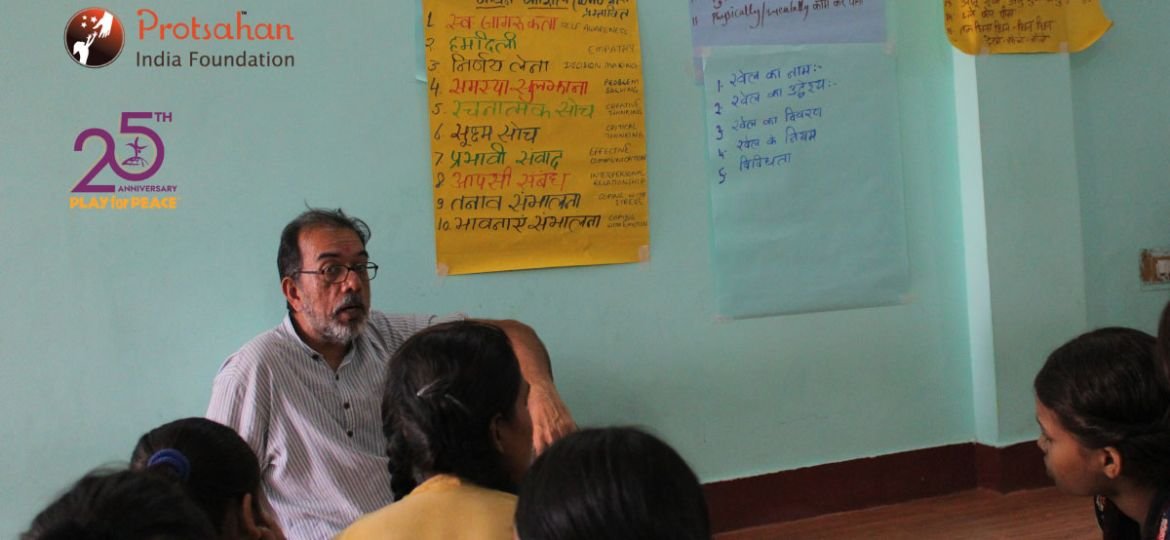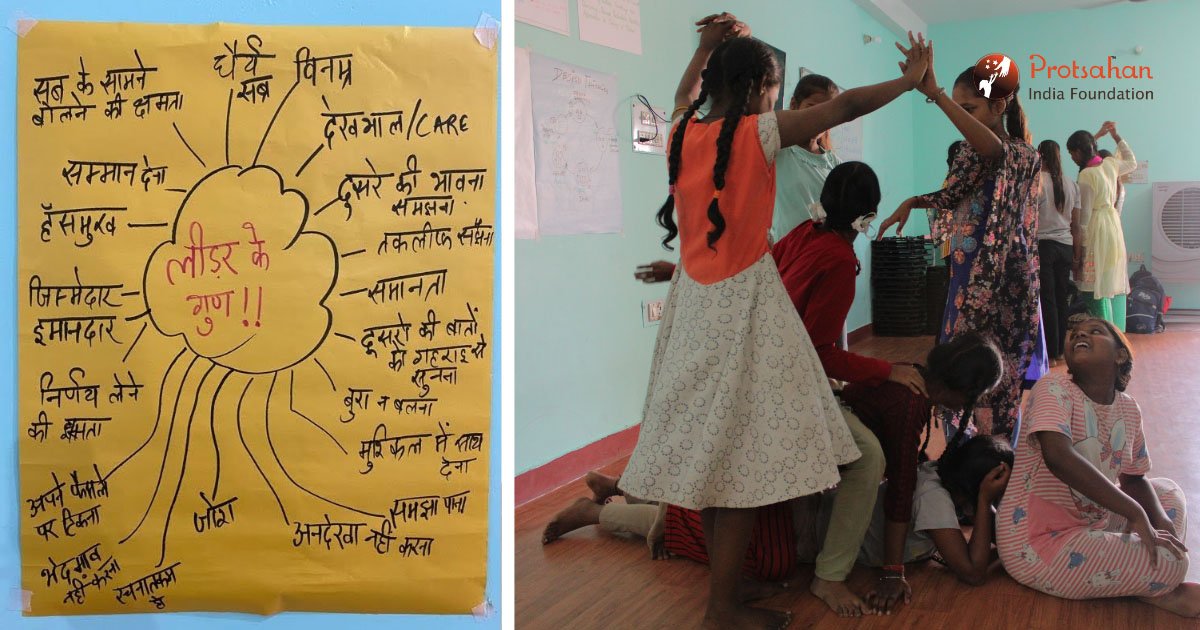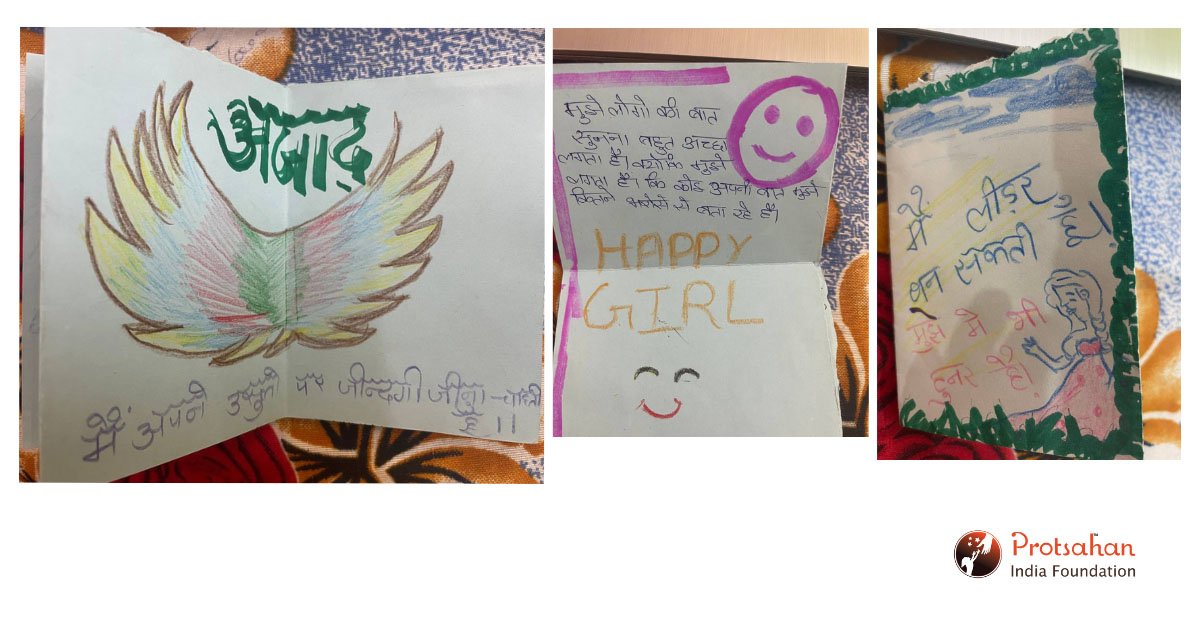
Author: Mansi Mandhani
Our Girl Empowerment Centre was full of bright-eyed, lively faces in mid-October this year, as we witnessed a four-day Play for Peace workshop by facilitators Swati and Agyat, for a carefully selected cohort of forty girls from Protsahan. Over the course of the workshop, the girls engaged in activities like zine-making, rap, and peer-led learning while engaging with practices of advocacy, inclusion, and self-reflection for well-being. With a dynamic environment, the workshop created a space for the girls to learn more about themselves and their community through play.
For migrant girls from Bihar, Rajasthan, Haryana, Uttar Pradesh, Jharkhand whom we work with in slums of Uttam Nagar, the absence of accessible spaces and platforms has deprived them of opportunities that could foster agency and empowerment. These participatory and child-friendly spaces at Protsahan are crucial in fostering an environment where their voices are heard, choices are respected, and agency becomes a pivotal aspect of gender-transformative empowerment at the grassroots. By providing avenues that offer inclusive participation, decision-making opportunities, and pathways for self-expression, using arts and play, our facilitators bridged this critical gap in the girls’ journey and made them take yet another step forward toward self-actualization and empowerment.
What is Play for Peace?
Play for Peace is an organization involving over 2,000 people spanning 40 countries, committed to bring together children and youth in communities affected by conflict using cooperative play to create compassion, laughter, and peace.
Play for Peace India works on issues based on the communities it serves, addressing equality, inclusivity, interfaith harmony, and female empowerment with the outlook of creating more equitable and inclusive peer spaces for children.
Experiential Learning using Arts at Protsahan
Experiential learning includes educational experiences where students learn by “doing”, engaging and reflecting. Since it includes multiple senses and cognitive processes, it considerably enhances knowledge retention and understanding. With its emphasis on enjoyment and participation, it also helps boost students’ motivation and initiative.
Developed by David A. Kolb, the Kolb Experiential Learning Theory is a widely recognized framework describing the process. Kolb (1984) described the ideal process of learning as a four-step cycle: Experiencing – Reflecting – Thinking – Acting.
 With critical thinking and analysis a crucial part of the learning process, this manner of education creates a participative, and dynamic environment.
With critical thinking and analysis a crucial part of the learning process, this manner of education creates a participative, and dynamic environment.
At the workshop, the girls engaged in this experiential learning through play in their safe space. For instance, at the “experiencing” stage of the cycle, they split into groups of seven to create a functional machine between themselves. The objective was to experience creative thinking and execution in a team.
As part of the “reflection” and “thinking” stages, they were asked to speak up about qualities of leadership that they would like to imbibe, and were encouraged to think deeply about what it would mean to uphold these qualities in team environments like the one they experienced.
 Following this, the girls were asked to split into teams again, to create a rap song for civil advocacy and self-expression this time, and were encouraged to experiment with and apply their recent learnings. This resulted in them participating in their learning with higher engagement and resolution.
Following this, the girls were asked to split into teams again, to create a rap song for civil advocacy and self-expression this time, and were encouraged to experiment with and apply their recent learnings. This resulted in them participating in their learning with higher engagement and resolution.
Creative engagement is at the core of what we do, as we work with our HEART model of Healing with Education, Art, Rights, and Technology. Activities like this help us facilitate holistic development for our girls, as they grow and gain higher agency in their communities. Over the workshop the girls created Zines as part of their reflective exercise, and their creative expression speaks for itself.
The workshop wasn’t merely an event; it was a catalyst for transforming mindsets. It provided a safe and brave space for these girls to explore, learn, and express themselves, nurturing their cognitive, emotional, and social development. Their zines and rap compositions stand as tangible manifestations of their journey—visual testaments to their growth, creativity, and empowerment.
 Sources:
Sources:
https://www.ncbi.nlm.nih.gov/pmc/articles/PMC8569223/ doi: 10.3389/fpsyg.2021.771272
https://experientiallearninginstitute.org/what-is-experiential-learning/
https://www.researchgate.net/publication/235701029_Experiential_Learning_Experience_As_The_Source_Of_Learning_And_Development

